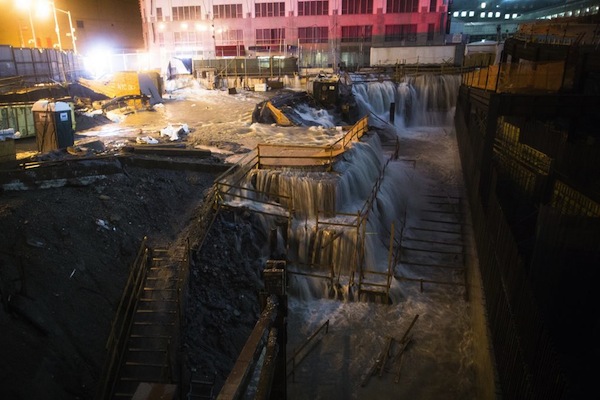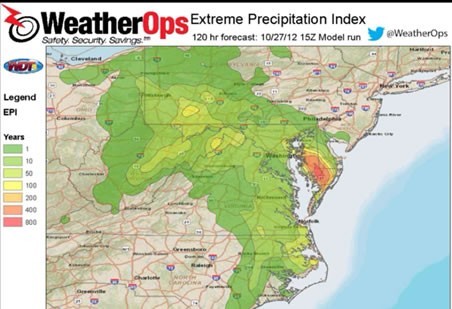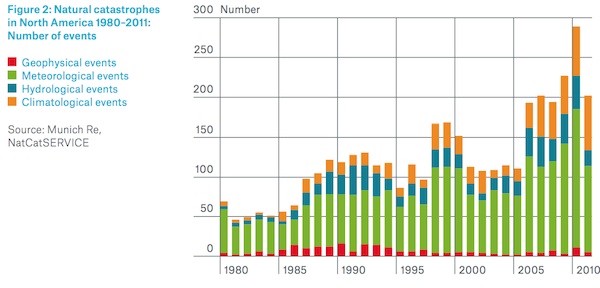A $20 Billion, 1000-Year Frankenstorm? Sandy Slams East Coast, Smashes All-Time Records.

“Atlantic City is under water. The boardwalk is in the street.” via @MikeStacks609
Disaster modeling company Eqecat projected today that “Hurricane Sandy is likely to cause insured losses of $5 billion to $10 billion and economic losses of $10 billion to $20 billion.” If it hits $20 billion, it would be among the top 5 costliest U.S. hurricanes — and the costliest one to hit the Northeast.
The final storm track has made the too-aptly named Atlantic City ground zero for Sandy. CNN Weather Center tweets:
NEW #RECORD daily rainfall set at Atlantic City, NJ! 4.55” of rain seen so far, shattering the old record of 2.33” set back in 1908!! #SANDY
The New York Times reports:
“The city is under siege,” said Thomas Foley, [AC’s] chief of emergency services. “Sandy is pretty furious at Atlantic City. She must have lost a bet or something. As we say in our slogan, ‘Do A.C.’ She’s doing A.C., all right.”
Or something! (see “Trenberth: Hurricane Sandy Mixes Super-Storm Conditions With Climate Change” and links below).
Weather Underground reported in its twitter feed today:
Atlantic City recorded a pressure of 959 mb at 4 pm, setting the city’s record for lowest pressure on record.
Twitter is definitely the place for finding the latest updates. The all-time record was 960.7 mb — and The Weather Channel’s Hurricane Central feed reported a few hours later:
Atlantic City down to 953.9 mb (28.17”) pressure and still plummeting.
TWC also tweets:
Barometric pressure in #Philly now 28.39”; this breaks their all-time low pressure record of 28.43”; set in March ‘93 superstorm
In fact, the record was set today for the lowest pressure ever recorded for a hurricane north of the Carolinas!
New York City is also slammed. TWC tweets:
The water level at the Battery in #NYC has reached 11.25 feet, surpassing the all-time record of 11.2 feet set in 1821.
Eric Holthaus tweeted for his Wall Street Journal weather feed:
NYSE closure tomorrow will mark first time the market closes FOR WEATHER on consecutive days since 1888.
The WSJ blog has reported, “NYC Subways Could Be Crippled for Days”:
Floodwaters rushed through Lower Manhattan on Monday night, inundating subway and automotive tunnels and likely forcing a prolonged shutdown of New York City’s mass-transit system. No clear estimate was available, and the Metropolitan Transportation Authority did not provide a timetable for reopening the subways. But the extent of flooding and the height of the storm surge appeared likely to meet or exceed the level of a 1992 nor’easter….
Jon Passantino tweets:
Wow: Floodwaters inundate Ground Zero construction site in NYC (via AP) pic.twitter.com/hiJFeHJW

Meanwhile, the Washington Post Weather Gang posted:
How historic would the amount of rain forecast be? Weather Decisions Technology (WDT) has prepared an analysis shown below. Its model projects Sandy to be a 500-to-1,000 year precipation event for some parts of the Mid-Atlantic with a 100-250 year precipitation event for broader areas….

Color shades indicate historic rainfall potential, e.g. 1-year rainfall event, 10-year rainfall event, etc. (WDT Weather Opps)
Coincidentally, as Climate Progress reported last week, Munich Re, a top reinsurer, released a major new study that for the first time, links the rapid rise in North American extreme weather catastrophes to manmade climate change:
“Climate-driven changes are already evident over the last few decades for severe thunderstorms, for heavy precipitation and flash flooding, for hurricane activity, and for heatwave, drought and wild-fire dynamics in parts of North America.”

At the same time non-climatic events (earthquakes, volcanos, tsunamis) have hardly changed, as the figure shows. The 274-page study, “Severe weather in North America” draws on “the most comprehensive natural catastrophe database worldwide.”
Prof. Peter Höppe, who heads Munich Re’s Geo Risks Research unit, said:
“In all likelihood, we have to regard this finding as an initial climate-change footprint in our US loss data from the last four decades. Previously, there had not been such a strong chain of evidence. If the first effects of climate change are already perceptible, all alerts and measures against it have become even more pressing.”
The time to act was over a decade ago, but now is better than later!
You can return to the main Market News page, or press the Back button on your browser.

